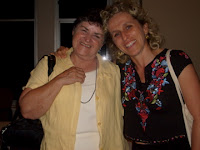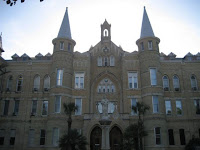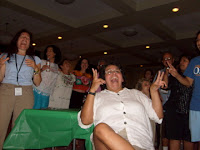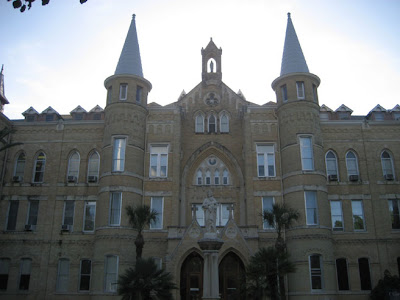Viewing: Blog Posts Tagged with: Wild Geese, Most Recent at Top [Help]
Results 1 - 5 of 5
Blog: Beth Kephart Books (Login to Add to MyJacketFlap)
JacketFlap tags: Mary Oliver, Wild Geese, Add a tag
Blog: Beth Kephart Books (Login to Add to MyJacketFlap)
JacketFlap tags: Mary Oliver, Wild Geese, UNDERCOVER, teen writers, Add a tag
 The extraordinary week that has been this week found me in a classroom last evening among teens who have lived through the hardest kinds of sorrow and who look at now and look ahead and imagine themselves writing. I'd written a talk. It was soon abandoned. It was more important to sit on a desk with my things sprawled about me and listen for the young writers' stories. We talked about whether or not writing heals, and about whether or not it's possible for writers to write what they do not know. Poems were recited from memory. Early plot lines unspooled. A question asked about the pretensions of books versus the power of movies. One of the girls in the room had been reading Undercover; she described it, with great sophistication, to her peers. One of the young men, a science fiction and horror writer, had also tried to read the book. It wasn't for him, he said, and then he worried that his words had somehow wounded.
The extraordinary week that has been this week found me in a classroom last evening among teens who have lived through the hardest kinds of sorrow and who look at now and look ahead and imagine themselves writing. I'd written a talk. It was soon abandoned. It was more important to sit on a desk with my things sprawled about me and listen for the young writers' stories. We talked about whether or not writing heals, and about whether or not it's possible for writers to write what they do not know. Poems were recited from memory. Early plot lines unspooled. A question asked about the pretensions of books versus the power of movies. One of the girls in the room had been reading Undercover; she described it, with great sophistication, to her peers. One of the young men, a science fiction and horror writer, had also tried to read the book. It wasn't for him, he said, and then he worried that his words had somehow wounded.
I had a copy of Mary Oliver's poem "Wild Geese" in my folder. I read it aloud. It was a still and perfect moment, a poem that spoke with force and meaning to the writers in that room. You do not have to be good, the poem begins. You do not have to walk on your knees/for a hundred miles through the desert, repenting.
"I like it a lot," the science fiction writer said. "It means we can be who we are."
Blog: Beth Kephart Books (Login to Add to MyJacketFlap)
JacketFlap tags: inspiration, Mary Oliver, Wild Geese, Seeing Past Z: Nurturing the Imagination in a Fast Forward World, writing workshop for teens, young women, Add a tag
 I've never been very good at letting moments go. Not skyscapes. Not heartaches. Not eighth-grade talent shows or that moment at graduation when the caps are frisbeed to the sky and the dividing line has been drawn between the future and the past.
I've never been very good at letting moments go. Not skyscapes. Not heartaches. Not eighth-grade talent shows or that moment at graduation when the caps are frisbeed to the sky and the dividing line has been drawn between the future and the past.
So that when I taught young writers for seven consecutive summers, I was, always, in my mind, with those young writers—traveling with them back and forth, trying to see past their page, thinking myself into their process and back out of it again—for their sake, in both directions. And when, today, I was joined on the second floor of a favorite local coffee shop by nine young women, I knew I'd go home with an ache in my heart—they'll all grow up; I'll never know where their lives now will take them.
Their talent runs deep, as does their capacity for thoughtful mutual critique. They listened—they heard—the fragments that I read out loud, some even asking later for titles so that they might read the wholes. There were among them the philosophical and poetical, the one who could write through time and the one who embraced the one moment, the one with a talent for original saturation, the one who knew how to suggest the possibilities of a character's life within the stretch of a single sentence. There was joy as we walked the streets with our cameras in hand. There was compassion for the child we found sitting near a grate, waiting for her mother to come to—well, what, we wondered: to rescue her?
Remain who you are, I urged them, at the session's end. Keep living: whole. And then I read them "Wild Geese" by Mary Oliver, a poem every true heart must know.
The closing lines:
Whoever you are, no matter how lonely,
the world offers itself to your imagination,
calls to you like the wild geese, harsh and exciting—
over and over announcing your place
in the family of things.
Blog: La Bloga (Login to Add to MyJacketFlap)
JacketFlap tags: seminars, writing workshop, Macondo Workshop, Sandra Cisneros, Add a tag
René Colato Laínez
These pictures are courtesy of many Macondistas. ¡Gracias!
*The Macondo Writing Workhop was celebrated from July 29 to August 5 in San Antonio, Texas.
*Most of the Macondistas stayed at the Our Lady of the Lake University dorms.
*Our famosas workshop teachers were Joy Harjo and Dorothy Allison.
*Our Macondistas teachers were Levi Romero, Liliana Valenzuela,
Alex Espinoza and Jackie Cuevas.
*We had great seminars throught the week. Just check the titles and presenters.
-Borderlands With in Us by Dr. Marga Speicher.
-Creating Real Life Characters- Yourself and Others by Gregg Barrios.
-Making Peace in Time of War by Baldemar Velasquez and Amelia Mesa-Baines
-The Political Essay by Norma Alarcon and Macarena Hernandez.
*Our invited literary agent was the talented Stefanie Von Borstel from Full Circle Literary.
*Natalia Treviño organized the Bexar County Juvenile Detention Center visit.
*Noche de Macondo at Esperanza Peace and Justice Center was a blast. Joy Harjo gave us a great concert.
*Jump-Start Theatre featured Dorothy Allison. Two or Three Things I know For Sure are that Dorothy is great, great and great.
*Lucha Corpi and Dr. Amalia Mesa-Bains received the Gloria Anzaldua’s Milagro Award.
*The yoga teacher was our Macondista Michelle Otero.
*The readings at Macondo BBQ were amazing and unpredictable.
*The talented children's Book Author Amada Irma Pérez read at the San Antonio Public Library.
*And as always Sandra Cisneros was our angel, amiga, consejera and la mera mera. Sandra all the Macondistas love you!
About the Macondo Workshop
The Macondo Writing Workshop is a unique summer gathering for writers working on geographic, cultural, social and spiritual borders.
Founded in 1995 by writer Sandra Cisneros and named after the sleepy town in Gabriel García Marquez's One Hundred Years of Solitude, the week-long workshop transforms San Antonio, Texas — and more broadly, La Frontera — into a space of intense artistic and cultural creativity.
Macondo is a master's-level workshop, meaning that participants are expected to take their writing seriously and to have fulfilled at least one of the following:
1. published a book or several stories in journals or magazines,
2. enrolled in or completed an MFA program, or
3. studied under at least three professional writers.
An essential aspect of the Macondo ethic is a global sense of community; workshop members should, in addition to being already established and capable of participating in a master's-level class, recognize their place as writers in our society and the world.
A second element of the Macondo ethic is a spirit of generosity. In the spirit of Sandra Cisneros, who volunteers valuable writing time for the nourishment of other writers.

Monetary contributions are accepted from those with better means to assist workshop participants who cannot fund their own airfare and lodging.
In addition, workshop members are expected to review each other's work with rigor and vision. Time is viewed as a gift equal to that of money, so time given is as valuable as cash!
The workshop is divided into three mixed-genre groups, each of them headed by an accomplished writer or team of writers. After attending one year, participants are allowed to enroll in Sandra Cisneros' class.
Mornings are spent individually reading each other's work, afternoons consist of "workshopping" by groups, and evenings are spent discussing various artistic, political and spiritual issues related to writing.
For more information visit www.macondoworkshop.org
Blog: La Bloga (Login to Add to MyJacketFlap)
JacketFlap tags: poem, Macondo Workshop, San Antonio, Our Lady of the Lake Univeristy, Add a tag
René Colato Laínez
This was my third time participating at the Sandra Cisneros’ Macondo Workshop in San Antonio, Texas. I was a Chuparosa, this year and my intention was to write in my dorm while the rest of the macondistas were in workshops. But at the last moment, I signed up for the Translingual Poetics Workshop led by Liliana Valenzuela and Levi Romero.
I wrote El castillo de la reina for a homework assignment. The homework was to observe a place in San Antonio and to write a poem using English and Spanish about that particular place. Most of the Macondistas stayed at the Our Lady of the Lake University dorms. I was not sure what to write about and decided to take a walk around the campus. When I saw the beautiful towers of the main building, I got the idea. I became a child and instead of the main building, it saw a castle but not any particular castle. It was el castillo de la reina. If you are familiar with the campus, you will recognized the talking traffic light: Wait Wait Wait…
El castillo de la reina
Today, I stood in front of a castle.
It must be the castle of a queen
Because I saw her white estatua in the entrance.
This must be el castillo de la reina.
This castillo is big.
It has two big cones on the top
Like giant party hats.
It has round circle windows
Where the reina may seat
And observe the busy street.
There are rectangles and square windows
And big crosses.
This reina must be a catolica.
This castillo de la reina is very pipirinais.
The doors of el castillo are big and I saw people
Coming in and coming out.
This reina must have many friends.
I wish I could visit her.
I will say, “Reina, your are la mera mera and
Your castillo is retequebonito.”
Uno, dos y tres
Here I go, to el castillo de la reina.
El semáforo
I need to cross the street to visit el castillo de la reina
But the traffic light is bien malcriada.
It says bad words, que grocerias fuchi.
I push the button to cross the street
And the traffic light spoke to me
This reina is very smart,
Tiene un semáforo que habla.
But it has a big mouth.
When I push the button
It says Güey not only one
But three times.
Güey, güey, güey
I frown at the red light
And say, “I will tell la reina, to change you.
You are not a nice semáforo.”
Yesterday, la reina told
That she did not have any visitors.
And I know why, “This semafaro malcriado,
Is el culpable.”
“Shame on you, “ I say
and I begin to cross the street.
This time the semáforo begins to count
One, two, three.
Don’t give me carrillas now
I am running as fast as I can.
La reina must know this right now.
El teléfono
El castillo de la reina
Has very beautiful gardens.
This reina has many trabajadores.
Every time I walk in the jardines
I see trabajadores cutting the bushes
watering the roses,
And driving carritos full
with boxes and bags
that go everywhere.
This reina esta en todo.
But suddenly a telephone rings
And a trabajador who is cutting
The leaves of a small tree
Answers the phone
And hides behind the tree.
He begins to whisper
And looks from left to right
Like if he looking for moros en la costa.
This is really strange,
Is he telling chismes about la reina?
How can he dare to do that!
In the meantime the manguera looks like a fuente
And is making a big pond of water.
Poor reina, the water bill will be very high next month.
And la reina is trying to conserve energia.
She must know about this too.
Soon the man in rolling with laughter
On the grass,
Is he now making chistes about la reina?
Stop it! I stomp my feet.
Don’t make fun of la reina.
And the man stands up
And put his hand in front of his forehead
Like a soldado.
“Yes, Reina,” the man says.
“I will change that traffic light right now.”
And he walks to the semáforo and it says
Güey four times.
This semáforo no respeta a nadie
Not even los trabajadores de la reina.
I will tell la reina to put a bilingual semaforo
That says espera and stop for the green light
to you visit el castillo de la reina.



Once again shows why sharing is so important.
I love that poem, too. It sounds like it was a wonderful evening.
The Wild Geese poem - that is what your blog tells me/does for me every time I come to visit. I've been wanting to tell you that the last couple of days and couldn't find the words. Then you gave them to me. As usual. Thank you, B.
What a great moment for all of you!
Beth, the humanity, frailty, and tenderness of being human is so well captured in this blip of moments. LOVE the poem you quoted. How perfect.
What a gift you gave them, abandoning your planned talk and listening, encouraging them to share their feelings about the healing power of words.
I wish I had been there :)
And now I feel a deep need to read the rest of the Wild Geese poem...
I like that a lot too.
What an amazing evening you all had.
I wish I could sit in such a group.